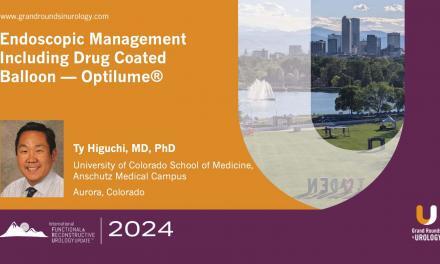Brian T. Helfand, MD, PhD, presented “Identification and Management of High-Risk Screening Populations” during the 35th International Prostate Cancer Update conference on February 9, 2025, in Vail, Colorado.
This content is available free to the GRU Community. Login or create an account to view it.
How to cite: Helfand, Brian T. “Identification and Management of High-Risk Screening Populations.” February 9, 2025. Accessed Nov 2025. https://grandroundsinurology.com/identification-and-management-of-high-risk-screening-populations/
Identification and Management of High-Risk Screening Populations – Summary
Brian T. Helfand, MD, PhD, NorthShore University Health System, Evanston, Illinois, addresses the role of genetic and polygenic risk scoring in identifying men at higher risk of developing prostate cancer. In this 12-minute presentation, Dr. Helfand identifies family history, racial background, and genetic mutations as key factors in assessing this risk.
Dr. Helfand stresses the crucial importance of identifying men with hereditary risks. Genetic mutations like BRCA1, BRCA2, ATM, and HOXB13 are linked to increased prostate cancer susceptibility. Polygenic risk scores are a powerful tool for predicting prostate cancer risk, with scores reflecting both increased and reduced likelihood of diagnosis.
Dr. Helfand stresses that genetic counseling is recommended to help patients understand potential insurance implications and to facilitate informed decision-making. Identifying high-risk men is critical for tailoring screening and treatment strategies.
About the 35th International Prostate Cancer Update:
The International Prostate Cancer Update (IPCU), is a multi-day, CME-accredited conference focused on new developments in prostate cancer treatment, diagnosis, and prevention. IPCU 35 will feature lectures, interactive discussions, panel roundtables, debates, and case reports. This conference is led by expert physicians and is designed for urologists, medical oncologists, radiation oncologists, and other healthcare professionals involved in the diagnosis and treatment of prostate cancer.
The goal of this educational program is to equip healthcare professionals involved in the diagnosis and treatment of prostate cancer with the up-to-date clinical knowledge and tools they need to best treat their patients. The program will discuss the treatment of prostate cancer from diagnosis to treating advanced and metastatic disease. The conference aims to give physicians exposure to a comprehensive review of treating prostate cancer patients and to give them a chance to discuss the issues with peers and experts. You can learn more about the conference here.
ABOUT THE AUTHOR
Brian T. Helfand, MD, PhD, is Chief of the Division of Urology and the Ronald L. Chez Family and Richard Melman Family Endowed Chair at NorthShore University HealthSystem. He is Director of the Personalized Prostate Program and Director of Clinical Research in the Program for Personalized Cancer Care (PPCC). He is also an active surgical scientist who is involved in the care of patients with prostate cancer. His clinical care and research is focused on the implementation of genetic tests and biomarker studies for prostate cancer.
Dr. Helfand completed his undergraduate degree at Emory University. He received his medical training and PhD in Cell and Molecular Biology and Genetics from Northwestern University. He is a fellowship-trained urologic oncologist who has focused his research career on prostate cancer. He was recruited in 2011 from Northwestern University’s Feinberg School of Medicine, where he was faculty in the Department of Urology. Dr. Helfand is an internationally-known urologist and genomic translational researcher. He has received multiple grants from the NIH and has published over 140 peer-reviewed manuscripts in journals such as Nature Genetics, The Journal of Cell Biology, and Science Translational Medicine.
Dr. Helfand is involved in national and international research collaborations as an active member of the International Consortium for Prostate Cancer Genetics (ICPCG), the Prostate Cancer Specialized Program of Research Excellence (SPORE), the IMPACT) study, and the Lower Urinary Tract Dysfunction Research Network (LURN). His current research goals are focused on germline genetic variations and mutations. He is determined to use this information to assist in personal and informed clinical decision making about prostate cancer screening and treatment for patients and their family members.




